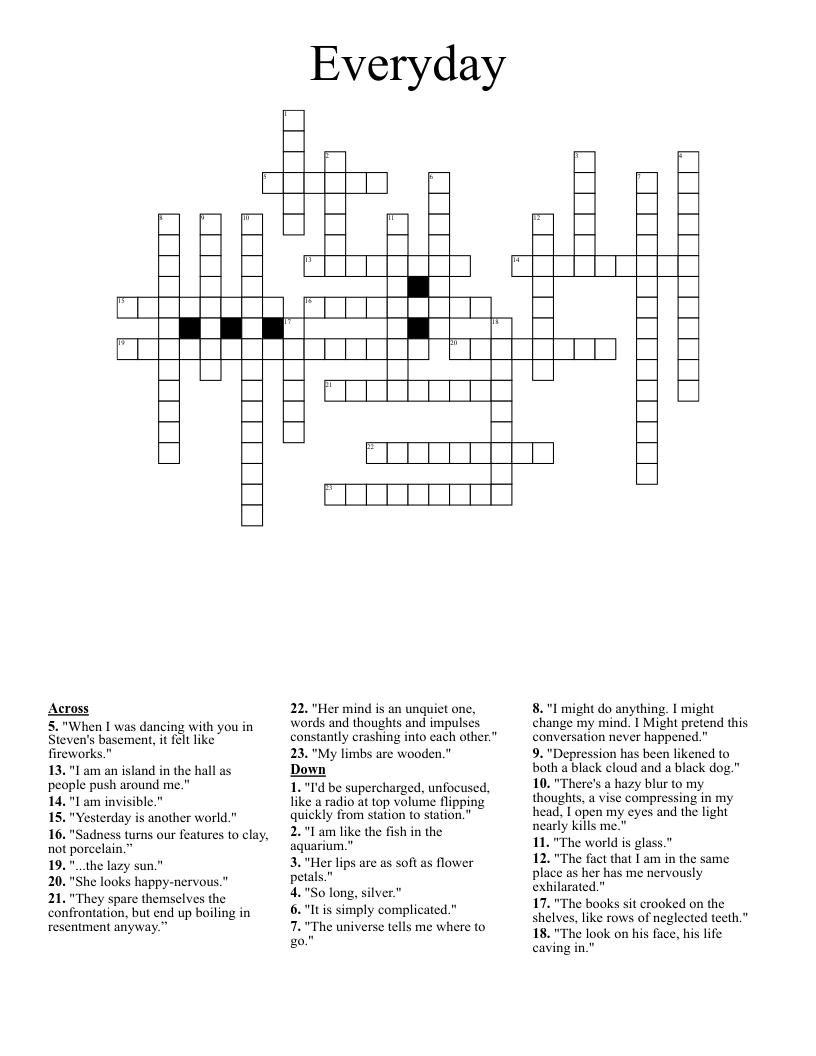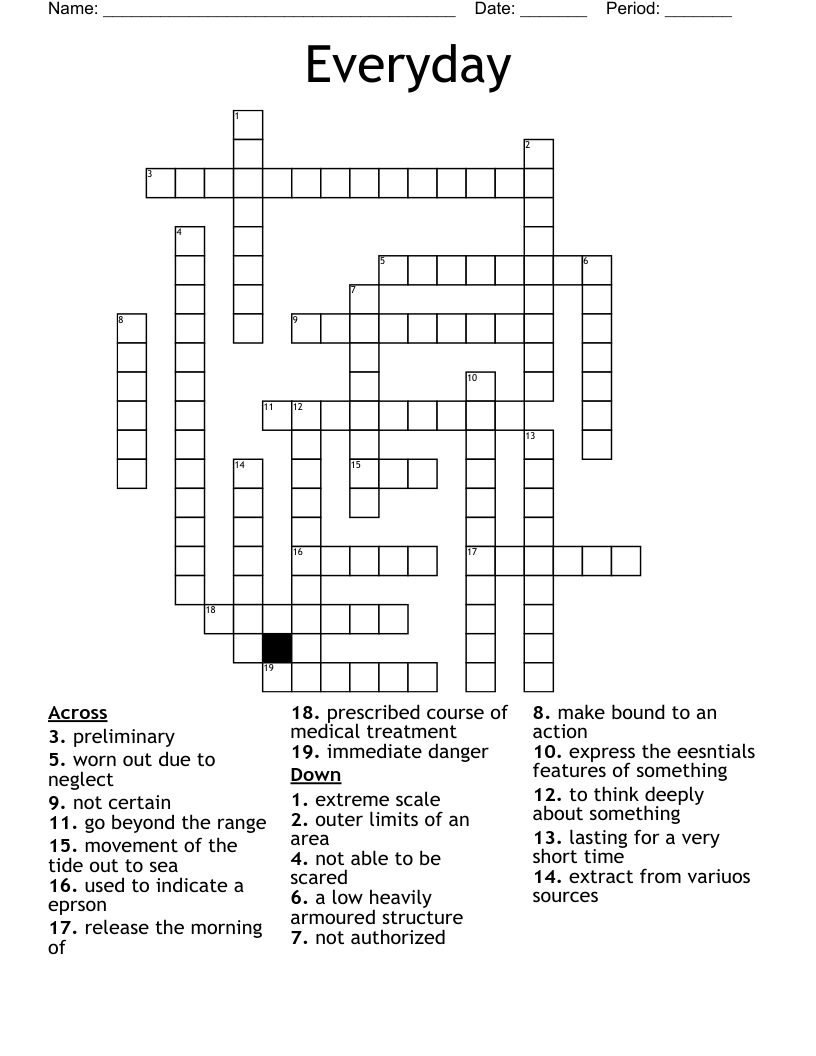Everyday Crossword: A Guide To Boosting Your Brainpower And Fun
Everyday crossword puzzles are not just a fun pastime; they are a powerful tool for mental stimulation and cognitive enhancement. In today’s fast-paced world, engaging in activities that challenge the mind is crucial for maintaining brain health. Crossword puzzles offer a unique blend of entertainment and education, appealing to people of all ages. By solving these puzzles regularly, individuals can improve their vocabulary, critical thinking skills, and even their memory.
This article will delve into the fascinating world of everyday crossword puzzles, exploring their history, benefits, strategies for solving them, and tips for getting started. Whether you are a beginner looking to dabble in crosswords or an experienced solver seeking to sharpen your skills, this comprehensive guide will provide valuable insights and information.
Join us as we uncover the secrets behind these intriguing puzzles and learn how to make the most out of your crossword-solving experience. Let’s embark on this journey and discover why everyday crossword puzzles have captivated millions around the globe!
Table of Contents
- 1. History of Crossword Puzzles
- 2. Benefits of Solving Everyday Crossword Puzzles
- 3. Types of Crossword Puzzles
- 4. Strategies for Solving Crosswords
- 5. Getting Started with Everyday Crosswords
- 6. Resources for Crossword Enthusiasts
- 7. Common Mistakes to Avoid
- 8. Conclusion
1. History of Crossword Puzzles
The first known crossword puzzle was published in the New York World newspaper on December 21, 1913, created by Arthur Wynne. It was a simple diamond-shaped grid that included clues for both across and down answers. This innovative format quickly gained popularity, leading to the creation of many variations and styles.
By the 1920s, crossword puzzles had become a staple in newspapers across the United States and Europe. The Great Depression saw a surge in their popularity as people sought affordable forms of entertainment. Today, everyday crossword puzzles can be found in newspapers, magazines, and online platforms, catering to a diverse audience.
2. Benefits of Solving Everyday Crossword Puzzles
Engaging in everyday crossword puzzles offers numerous cognitive and emotional benefits, including:
- Improved Vocabulary: Regularly solving crosswords exposes you to new words, enhancing your language skills.
- Enhanced Memory: Remembering clues and answers helps improve both short-term and long-term memory.
- Critical Thinking Skills: Crosswords require logical reasoning and problem-solving abilities.
- Stress Relief: Focusing on puzzles can provide a mental break from daily stressors.
- Social Interaction: Sharing puzzles with friends or family can foster social connections.
3. Types of Crossword Puzzles
There are various types of crossword puzzles, each with its unique characteristics:
3.1. Standard Crosswords
These are the most common form, featuring a square grid with words intersecting at shared letters. Clues can range from straightforward definitions to cryptic hints.
3.2. Cryptic Crosswords
Popular in the UK, cryptic crosswords require solvers to decipher clues that often involve wordplay, anagrams, or hidden meanings.
3.3. Themed Crosswords
These puzzles revolve around a specific theme, with clues and answers related to that theme, making them enjoyable and engaging.
3.4. Variety Crosswords
These include variations like diagramless puzzles, acrostics, and themed crosswords, offering different challenges and formats.
4. Strategies for Solving Crosswords
To tackle everyday crossword puzzles effectively, consider the following strategies:
- Start with the Easy Clues: Fill in answers you know first to create a foundation for solving the rest.
- Use Pencil: If you're solving on paper, use a pencil to easily make corrections.
- Look for Patterns: Familiarize yourself with common letter combinations and word patterns.
- Cross-Referencing: Use intersecting words to help guess answers you’re uncertain about.
- Take Breaks: If you’re stuck, take a break and return with a fresh perspective.
5. Getting Started with Everyday Crosswords
If you are new to crossword puzzles, here are some tips to help you get started:
- Choose Beginner-Friendly Puzzles: Start with easy puzzles that have straightforward clues.
- Set Aside Time: Dedicate a specific time each day to work on puzzles for consistency.
- Join a Crossword Community: Engage with fellow enthusiasts online or in local groups.
- Practice Regularly: The more you practice, the better you’ll become at solving puzzles.
6. Resources for Crossword Enthusiasts
There are numerous resources available for crossword enthusiasts:
- Books: Many books are dedicated to crossword puzzles of varying difficulty levels.
- Websites: Online platforms like NYTimes.com and CrosswordPuzzles.com offer daily puzzles.
- Apps: Download crossword puzzle apps for on-the-go solving.
- Communities: Online forums and social media groups provide support and tips for solvers.
7. Common Mistakes to Avoid
Even experienced solvers can make mistakes. Here are some common pitfalls to avoid:
- Ignoring the Theme: In themed crosswords, clues may relate to the theme; overlooking this can lead to confusion.
- Rushing: Take your time to think through clues; rushing can lead to errors.
- Not Checking Crosses: Always check intersecting answers to ensure accuracy.
8. Conclusion
Everyday crossword puzzles offer a delightful way to engage your mind while having fun. By understanding the history, benefits, types, and strategies, you can enhance your crossword-solving skills and enjoy the process even more. So, grab a pencil, choose a puzzle, and start boosting your brainpower today!
We invite you to leave a comment below sharing your favorite crossword experience or tips. Don’t forget to share this article with fellow crossword enthusiasts and explore more exciting content on our site!
Thank you for reading! We hope to see you back for more intriguing articles and brain-teasing puzzles!
Article Recommendations
- Herwin Williams A Visionary Leader In Modern Art And Design
- Power Rengers The Ultimate Guide To The Iconic Franchise
- Unveiling Justaminx Tiktok The Rising Star Of Social Media


